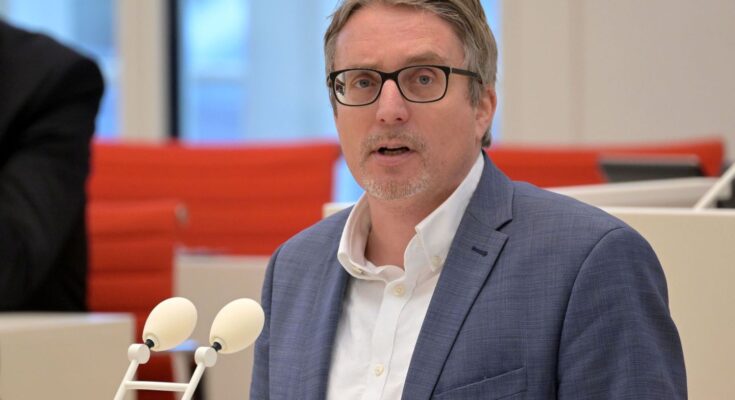Coalition crisis
The SPD tolerated the lack of a coalition majority – the fuss in the BSW
The majority of BSW MPs want to vote against the government’s two media deals. He was torn. The SPD in state parliament signaled accommodation – which also came with demands.
The collapse of the SPD/BSW coalition in Brandenburg in the dispute over broadcasting reform has been averted for now. The SPD parliamentary group wants to remain in the coalition despite the BSW majority voting against two government media contracts. The BSW faction, divided, is in crisis: there is a vote of no confidence in the leadership. However, there is a possible solution through an initial vote on state contracts at a key committee on Wednesday. In voting at the plenary session next week, BSW remained with a majority vote of no.
SPD parliamentary group leader Björn Lüttmann was pleased with the signal. “There is absolute agreement that we want to continue this coalition,” Lüttmann said after the meeting. But he warned: “It is also very clear that we expect this situation to persist in the future. Something like this must not happen again,” Lüttmann said. The hope is, “in the future there will be unity again, we will vote together, as stated in the coalition agreement.” The SPD has so far called for a unified approach from the coalition that has been in place for almost a year.
This coalition does not have a majority
There is turmoil in the BSW parliamentary group considering the coalition crisis. According to information from the German Press Agency, four members of parliament submitted a motion of no confidence against the executive committee of the parliamentary group led by its chairman Niels-Olaf Lüders. Parliamentary groups are divided in a dispute over two government media deals on broadcasting reform and more media protections for young people.
In the state parliament’s main committee, Finance Minister Robert Crumbach (BSW) is expected to vote yes, and BSW parliamentary group chairman Niels-Olaf Lüders will vote no. Ahead of the plenary session, Lüders announced: “Nothing has changed in our stance on media agreements.” The BSW parliamentary group passed a resolution a week ago, most of which goes against the state contract. BSW’s federal executive board previously rejected the reform.
BSW MP André von Ossowski said he introduced the motion with the support of three other MPs because they were “very dissatisfied with the leadership of the group, with the transparency of their decisions.”
Don’t you want to miss something more from the star?
Personal, competent and entertaining: Editor-in-Chief Gregor Peter Schmitz sends you the most important content from his free newsletter every Wednesday star-Editorial and classify what Germany is talking about. Click here to register.
The CDU opposition may save broadcasting reform
The government’s media deal is expected to pass thanks to the CDU’s opposition. The CDU’s parliamentary group will approve the government’s media deal both at the main committee and next week in a plenary session, parliamentary group leader Jan Redmann said. Only the state parliaments of Brandenburg and Lower Saxony do not exist nationally. The state parliament will vote on 19/20. A final decision on the state agreement will be taken in November.
The Brandenburg Cabinet approved the contract with BSW participation in the spring. BSW calls for further broadcasting reform. The outgoing federal chair of the BSW, Sahra Wagenknecht, said on Monday that she did not want to give up the coalition between the SPD and BSW in Brandenburg. But he defended the rejection.
dpa



